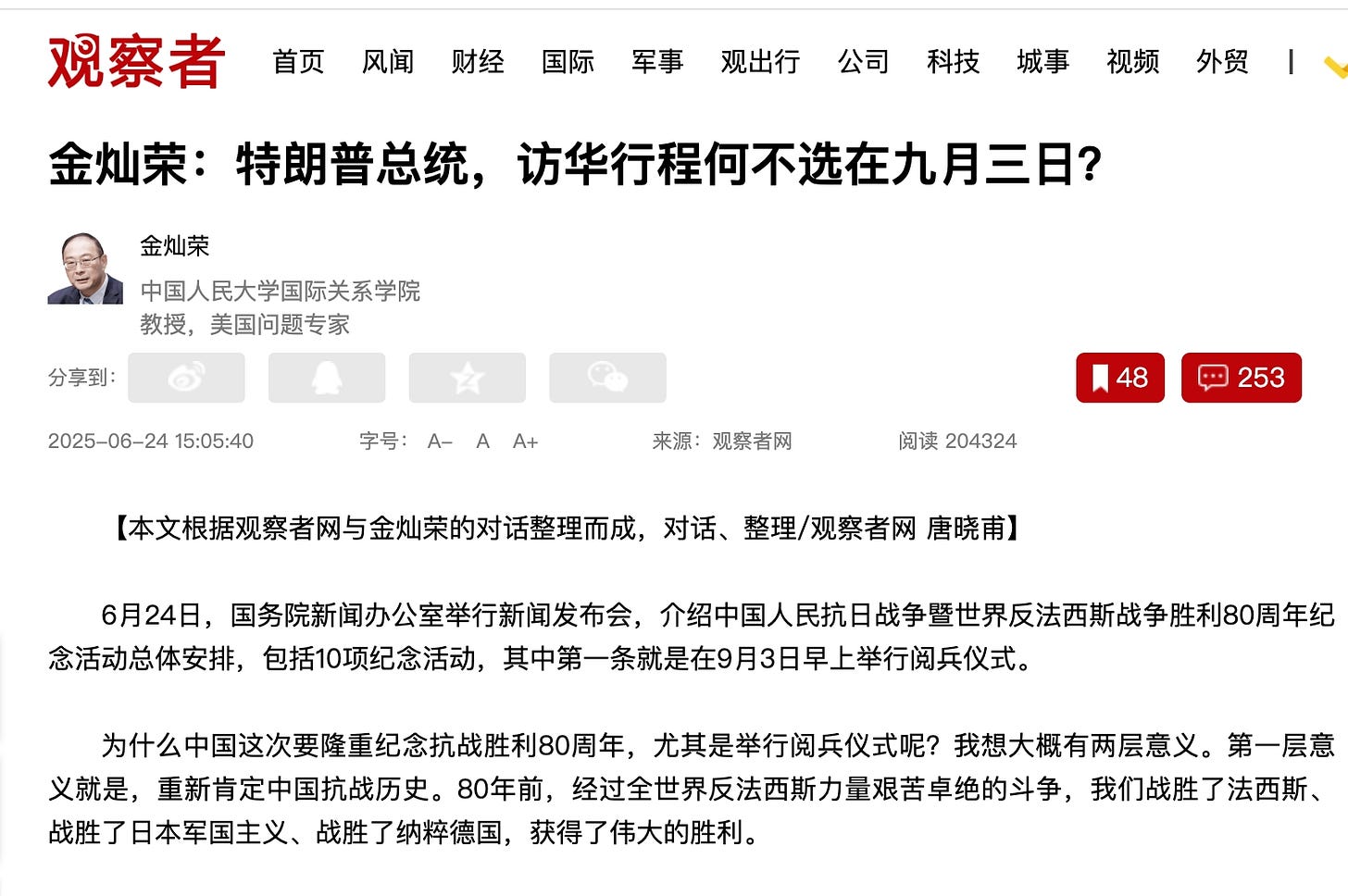Jin Canrong: President Trump, why not choose September 3rd for your visit to China?
Yesterday, Observer (guancha.cn) published a transcribed conversation with Professor Jin Canrong(金灿荣), a prominent expert on U.S. affairs and professor at the School of International Studies at Renmin University of China. In the interview, Professor Jin suggested that President Donald Trump visit China with his wife on September 3rd, coinciding with the 80th anniversary military parade commemorating China’s victory in the War of Resistance Against Japanese Aggression. He argued that such a visit would not only highlight the deep historical friendship between China and the United States, but also inject a much-needed sense of peace and stability into today’s turbulent international environment.
Below is the full translation of his remarks:
On June 24, the State Council Information Office held a press conference to announce the overall arrangements for the 80th anniversary of the victory of the Chinese People's War of Resistance Against Japanese Aggression and the World Anti-Fascist War. Among the ten commemorative events planned, the first is a military parade to be held on the morning of September 3.
Why is China commemorating the 80th anniversary so grandly this year, especially with a military parade? I think there are two main reasons.
The first is to reaffirm China’s historical role in the victory over fascism. Eighty years ago, through the tremendous efforts of global anti-fascist forces, we defeated fascism, Japanese militarism, and Nazi Germany. WWII is critical because it laid the foundation for today’s international order centered on the United Nations. China cherishes this victory and the current global structure, but recently there have been worrying trends.
Some Western voices are downplaying the Soviet Union’s role in WWII, and China’s contributions are also not being fully recognized. China’s position is clear: during WWII, the main battlefield in Europe was between Germany and the Soviet Union, and in Asia, it was China.
However, perceptions in the West have shifted. For example, Europe once acknowledged the Soviet Red Army’s role, but since the Soviet Union’s collapse, this recognition has eroded. A recent French poll showed young people ranking the U.S. military’s role in Europe above that of the Soviet Red Army, reflecting a revisionist trend.
On the Asian side, Japan’s right-wing forces, especially militarists, continue to obscure or deny Japan’s wartime atrocities. This has contributed to historical revisionism. We must restore the historical truth—China was the main Asian battlefield in WWII and played an irreplaceable role in the overall victory.
In January 1942, in his State of the Union Address following Pearl Harbor, U.S. President Franklin D. Roosevelt praised China’s resistance, saying: “We are working with the brave Chinese people—millions who, for over four and a half years, have held out against bombing and starvation, against the might of the Japanese, and have again and again defeated the invaders."
Looking back, many European countries surrendered quickly after WWII began: Denmark in six hours, the Netherlands in five days, and France in just over a month. They had equipment but lacked the will to resist. In contrast, China, though poorly equipped, fought alone against Japanese militarism for over a decade.
If China had surrendered like Europe, the course of the war would have changed entirely. Japan would have exploited China’s natural and human resources, gained massive strength, and potentially formed a joint Sino-Japanese force. Roosevelt once said in his memoir: “Without China, had China fallen, imagine how many divisions of Japanese troops could have been deployed elsewhere. They could have easily taken Australia, India, even moved into the Middle East.” Yet the West has largely forgotten this.
So this year, China is commemorating the 80th anniversary to correct historical memory. Forgetting history is a form of betrayal. This is why a grand military parade is essential.
The second purpose is to serve present realities. With the world facing volatile conflicts—Iran-Israel tensions, the Russia-Ukraine war, Gaza, India-Pakistan—some fear World War III is looming. By showcasing China’s strength and commitment to peace through a military parade, we send a deterrent signal to warmongers.
Just two days ago, on June 22, Russia confirmed that President Putin will visit China in late August, staying for four days, with one key event being the September 3 parade.
This will be a return visit—President Xi attended Russia’s own WWII parade on May 9. Now Putin will stand beside Xi at China’s parade.
Given this, why not extend a similar invitation to President Trump? On June 5, the Chinese and U.S. leaders spoke for an hour and a half by phone. President Xi confirmed he welcomed Trump to visit China again.
Why not align Trump’s visit with the September 3 parade? From 1941 to 1945, China and the U.S. were allies against Japanese militarism. America provided aid and support, including the Flying Tigers; Chinese civilians showed warmth and solidarity in return. It was a meaningful chapter in the two countries’ shared history.
Having President Trump and First Lady Melania attend the 80th anniversary parade would highlight that legacy, reminding the world that China and the U.S. once stood shoulder-to-shoulder to defend peace in Asia and the Pacific.
Their attendance could also spark imagination: when China and the U.S. work together, challenges like Japanese militarism fall; when they fight each other, both sides suffer—as in Korea or Vietnam.
If President Trump visits China and attends the parade on September 3, it would send a strong, positive signal to the world. The image of the Chinese, Russian, and American leaders standing together could be a powerful message of peace and stability. These three nations hold the greatest global power—their cooperation could calm conflict and shape a more peaceful future.
Of course, this is just my personal suggestion. The Chinese government is already committed to commemorating the 80th anniversary with full honors. President Putin will be there. If President Trump also comes, it would allow both peoples to reflect on their wartime alliance and remind us all that cooperation, not confrontation, is the path to peace.


